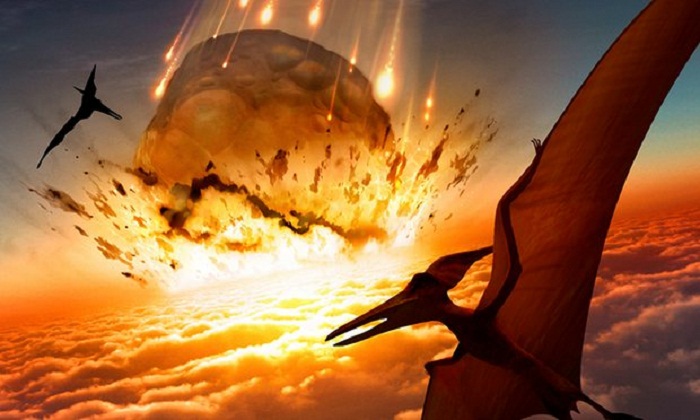Dinosaurs killed off by `one-two punch` of climate change and asteroid strike – study

Ten of the 24 species which disappeared at one Antarctic island did so long before the comet or an asteroid hit the planet some 66m years ago.
The other 14 disappeared in a second extinction wave that started with the impact contributing to the second-biggest mass extinction in history.
Nearly half of life on Earth, including all non-avian dinosaurs, were wiped out.
The dinosaurs’ demise, according to US-based researchers in the new paper, was caused by two periods of global warming – the first sparked by monster volcanic eruptions in what is India today, and the second by the asteroid’s impact.
Both sets of calamities would have emitted ash and dust with short-term Sun-blocking and cooling effects, but also massive ejections of planet-heating greenhouse gases that would have caused “warming episodes” in the longer term.
“We find that the end-Cretaceous mass extinction was caused by a combination of the volcanism and asteroid impact, delivering a theoretical ‘one-two punch’,” said study co-author Sierra Petersen of the University of Michigan, using boxing terminology.
The team analysed the chemical composition of 29 fossilised shells from the period, to compile a brand-new temperature record spanning 3.5m years over the end of the Cretaceous and beginning of the Palaeogene eras.
The shells lived 65.5m to 69m years ago in a shallow coastal delta near the northern tip of the Antarctic peninsula, said a statement from the university.
At the time, the now ice-covered continent was likely covered by coniferous forest.
Petersen’s team found that ocean temperatures rose about 7.8C (14F) after one of history’s biggest volcanic eruptions, in India’s volatile Deccan Traps region, which lasted thousands of years and spewed poisonous gases into the atmosphere.
A second spike on the thermometer, about 1.1C, followed some 150,000 years later, around the time of the impact.
“This new temperature record provides a direct link between the volcanism and impact events and the extinction pulses – that link being climate change,” said Petersen.
Scientists have long debated the cause of the so-called Cretaceous-Palaeogene (K-Pg) mass extinction, which led to the rise of the mammals.
Some blame the impact, some volcanism, others a combination.
Recent studies have pointed to the role of volcanic eruptions that came after, rather than before, the asteroid crash.
Pre-impact warming due to volcanism “may have increased ecosystem stress, making the ecosystem more vulnerable to collapse when the meteorite hit,” the team concluded.
In today’s world, scientists warn that planet warming caused by humankind’s burning of fossil fuels for energy, is contributing to another mass extinction event, the sixth in half a billion years.
Climate change causes sea levels to rise, species to die out, diseases to spread, storm intensity to increase, dry areas to become drier and wet ones wetter.















































